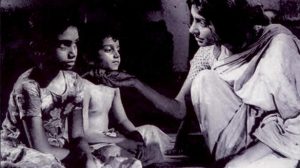Cineflections-44
Thulabharam (The Scales) – 1968, Malayalam
-Manjula Jonnalagadda
“Poverty is the worst form of violence.” – Mahatma Gandhi
Thulabharam is a Malayalam film directed by A. Vincent based on a play penned by Thoppil Bhasi for Kerala People’s Arts Club. The film won the National Award for the Second Best Feature Film and the Best Actress Award for the actress Sarada. The film was commercially very successful and was remade in Telugu and Hindi.
- Vincent started his film career as a guest cinematographer for the Telugu film Chandirani. His first film as a Cinematographer was P. Bhaskaran’s Neelakuyil. Vincent is considered one of the finest cinematographers of India along with K.K. Mahajan and V.K. Murthy. His first film as a director was Bhargavi Nilayam. He directed about 30 films, many of them were commercially successful and won awards.
Thoppil Bhasi was a playwright, screenplay writer, and a film director. A member of the Communist Party of India, his works were heavily influenced by Marxism. His play Ningalenne Communistakki (You Made Me Communist) is considered a groundbreaking play in the Malayalam Theater. He won several awards including Kerala Sangeetha Nataka Academy Award and Kerala Sahithya Academy Award.
The film opens in a court where Vijaya is facing a trial for killing her three children. Valsala, the public prosecutor, is seeking the death penalty to be awarded to Vijaya. Vijaya starts telling her story in the court. Vijaya and Valsala were close friends during their college days. Valsala’s father is a crooked lawyer named Achyuthen Nair. Achyuthen is representing Vijaya’s father R.K. Menon in a court case. Achyuthen loses the court case deliberately, that brings R.K. Menon and Vijaya to the streets. R.K. Menon succumbs to cardiac arrest leaving Vijaya orphaned.
Achyuthen doesn’t want Vijaya to move in with them and Vijaya’s love interest doesn’t want her any more. Vijaya marries Ramu who has been helping her through the crisis. Vijaya marriage turns out to be a happy one. Vijaya and Ramu have three children then things start crumbling down. Vijaya’s story is all about her inability to cope with hunger and her husband’s death.
The film showcases some of the effects of corruption on people’s lives. Achyuten Nair is corrupt. He loses Menon’s case on purpose in exchange for favors. This results in the first peril for Vijaya. Ramu is a union leader. Their union goes on strike for better working conditions. But the management shuts down the factory temporarily. Vijaya gets her second blow, as they don’t have income anymore.
There are also overtures of patriarchy. When Vijaya’s father dies, Valsala wants to support her friend. Her father does not allow it. Valsala being a dependent cannot go against her father. When Vijaya wants to get a job, Ramu does not help her. After Ramu is murdered, Vijaya has problems as Ramu’s murder works against her getting a job.
The film is more plot driven than character driven. The film is heavily influenced by Marxist philosophy. It is melodramatic and a bit heavy handed. The director wants the audience to feel the plight of the downtrodden. He succeeds in doing so.
The film is well shot and well edited. The soundtrack in the film is quite good. I do not understand the lyrics, but the music is good so is the background score. Camera work is excellent!!
The film won Sarada who played Vijaya, her first National Award. In my opinion, she is one of the finest actresses of Indian cinema. I just wish the directors didn’t make her cry as much. She can emote sadness without shedding a tear, that would be way more effective than making her cry all the time. Prem Nazir is well restrained. Sheela as Valsala is also very good.
Watch this film to get a glimpse of Kerala in the late 1960s and also for Sarada.
*****


